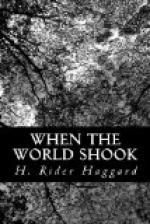“Stop talking about eating and help us to haul up the canoe,” said Bickley.
Between the three of us we dragged and carried the canoe a long way from the lake, fearing lest the natives should come and bear it off with our provisions. Then, having given Tommy his breakfast off the scraps, we walked to the cave. I glanced at my companions. Bickley’s face was alight with scientific eagerness. Here are not dreams or speculations, but facts to be learned, it seemed to say, and I will learn them. The past is going to show me some of its secrets, to tell me how men of long ago lived and died and how far they had advanced to that point on the road of civilisation at which I stand in my little hour of existence.
That of Bastin was mildly interested, no more. Obviously, with half his mind he was thinking of something else, probably of his converts on the main island and of the school class fixed for this hour which circumstances prevented him from attending. Indeed, like Lot’s wife he was casting glances behind him towards the wicked place from which he had been forced to flee.
Neither the past nor the future had much real interest for Bastin; any more than they had for Bickley, though for different reasons. The former was done with; the latter he was quite content to leave in other hands. If he had any clear idea thereof, probably that undiscovered land appeared to him as a big, pleasant place where are no unbelievers or erroneous doctrines, and all sinners will be sternly repressed, in which, clad in a white surplice with all proper ecclesiastical trappings, he would argue eternally with the Early Fathers and in due course utterly annihilate Bickley, that is in a moral sense. Personally and as a man he was extremely attached to Bickley as a necessary and wrong-headed nuisance to which he had become accustomed.
And I! What did I feel? I do not know; I cannot describe. An extraordinary attraction, a semi-spiritual exaltation, I think. That cave mouth might have been a magnet drawing my soul. With my body I should have been afraid, as I daresay I was, for our circumstances were sufficiently desperate. Here we were, castaways upon an island, probably uncharted, one of thousands in the recesses of a vast ocean, from which we had little chance of escape. More, having offended the religious instincts of the primeval inhabitants of that island, we had been forced to flee to a rocky mountain in the centre of a lake, where, after the food we had brought with us by accident was consumed, we should no doubt be forced to choose between death by starvation, or, if we attempted to retreat, at the hands of justly infuriated savages. Yet these facts did not oppress me, for I was being drawn, drawn to I knew not what, and if it were to doom—well, no matter.




